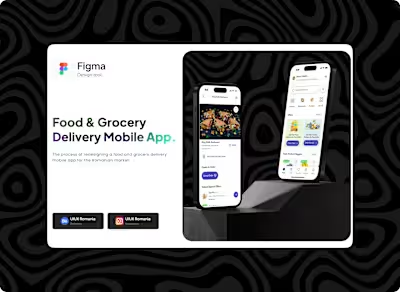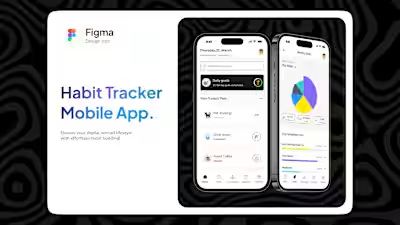Hotel Booking Mobile App.
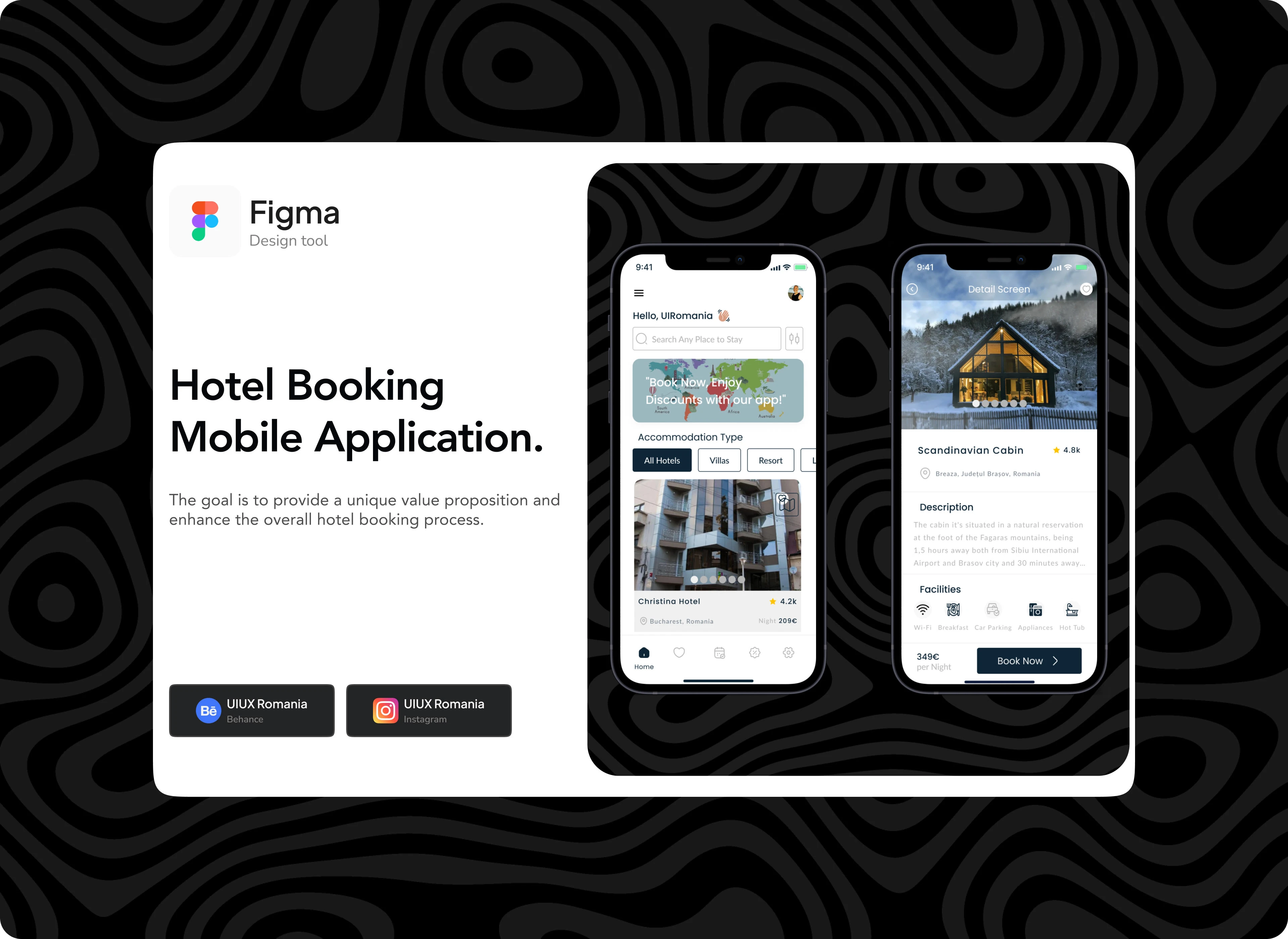
Hotel Booking Mobile App,
Introduction
As an a UX/UI Designer, your role is to create a mobile app for hotel booking. The objective is to design a user-friendly and seamless experience for users, addressing the limitations of existing apps such as Booking.com and Airbnb. The goal is to provide a unique value proposition and enhance the overall hotel booking process.
Project Overview
The project aims to develop a mobile app that allows users to easily search, book, and manage hotel reservations. The app will offer personalized recommendations, simplify the booking process, and provide a seamless post-stay experience. By addressing pain points and improving upon existing solutions, the app seeks to provide a competitive edge in the hotel booking market.
Problem Statement
While existing hotel booking apps offer a range of features and options, there are still significant pain points that users encounter during their booking journey. These pain points include:
Lack of personalization: Current apps fail to provide personalized recommendations and tailored search results based on user preferences, resulting in users having to manually sift through countless options to find the perfect accommodation.
Complex search filters: The available search filters in existing apps often overwhelm users, making it challenging to narrow down their search criteria effectively. Users are left frustrated and overwhelmed with too many irrelevant options.
Inconsistent user experience: The user experience across different stages of the booking process, from search to payment and confirmation, lacks consistency. This inconsistency results in a disjointed and confusing experience for users, causing them to lose trust and abandon bookings.
Limited transparency: Users often face difficulties in accessing detailed information about accommodations, such as accurate pricing, availability, and specific amenities. This lack of transparency hinders users' ability to make informed decisions and may lead to disappointments upon arrival.
Target Audience
To ensure the success of our hotel booking app, it is crucial to define our target audience. Through extensive market research and user analysis, we have identified the following target audience for our app:
Business Travelers: This segment comprises professionals who frequently travel for work. They require convenient and efficient hotel booking services that cater to their specific needs, such as proximity to business centers, reliable Wi-Fi, and seamless check-in/check-out processes.
Leisure Travelers: This group consists of individuals or families planning vacations or weekend getaways. They seek a wide range of accommodation options, personalized recommendations based on their interests and preferences, and access to local attractions and activities.
Budget Travelers: These individuals prioritize cost-effective accommodations and are often looking for the best deals, discounts, and offers. They value transparency in pricing, reliable customer reviews, and the ability to compare prices across multiple options.
Solo Travelers: Solo travelers, including backpackers and digital nomads, seek accommodation options that promote safety, social connections, and opportunities to meet fellow travelers. They are interested in features such as shared spaces, communal activities, and recommendations for solo-friendly destinations.
Family Travelers: Families require accommodations that cater to their unique needs, including larger rooms or interconnected suites, child-friendly amenities, and proximity to family-friendly attractions. They also appreciate the ability to filter and search for family-oriented amenities.
Luxury Travelers: This segment consists of individuals seeking high-end accommodations and exclusive experiences. They value luxury amenities, personalized concierge services, and seamless booking processes that reflect their discerning taste and preferences.
To further refine our understanding of the target audience, we will conduct user interviews, surveys, and market research to gather insights into their preferences, pain points, and motivations. This research will allow us to empathize with our users, better understand their needs, and create a user-centered design that resonates with our target audience.
Reason Behind the Project
Despite the presence of popular hotel booking apps, there are still opportunities to improve the user experience. Existing apps often overwhelm users with a large number of options and lack personalization. This project aims to design an app that addresses these pain points and provides a more tailored experience for users. By offering a streamlined and personalized booking process, the app can attract users seeking a more efficient and convenient hotel booking solution.
User Research
User research is a critical step in understanding the target audience and their needs. It helps inform the design decisions and ensures that the app meets user expectations. The research process included various methods such as surveys, interviews, and competitor analysis.
Users expressed frustration with the overwhelming number of search results and limited personalization options.
Trustworthiness and authenticity of reviews were significant concerns.
Users desired a simplified booking process with clear information on amenities and pricing.
Local recommendations and integration with social platforms were seen as valuable features.
User Interviews
To gather valuable insights, a series of user interviews were conducted with potential users. The interviews aimed to understand their booking habits, pain points, motivations, and desired improvements. Here are some key questions and insights gathered from the interviews:
How do you currently book hotels?
Many users mentioned using popular hotel booking apps such as Booking.com and Airbnb. However, they expressed frustrations with the overwhelming number of options and the lack of personalization.
What are the challenges you face while booking hotels?
Users mentioned difficulties in finding suitable hotels based on their preferences and limited control over booking options such as room preferences and amenities.
What features or improvements would you like to see in a hotel booking app?
Users expressed a desire for personalized recommendations based on their travel preferences, clearer information on amenities and pricing, and an intuitive and streamlined booking process.
How do you typically make your final decision when booking a hotel?
Users consider a combination of factors, including price, location, reviews, and the overall value offered. Trustworthy reviews from verified guests greatly influence my decision.
Have you ever encountered any issues or concerns with hotel bookings? If so, what were they?
Users Mentioned Yes, on a few occasions, the actual hotel room didn't match the photos or description provided online. It was disappointing and made me question the reliability of the booking platform.
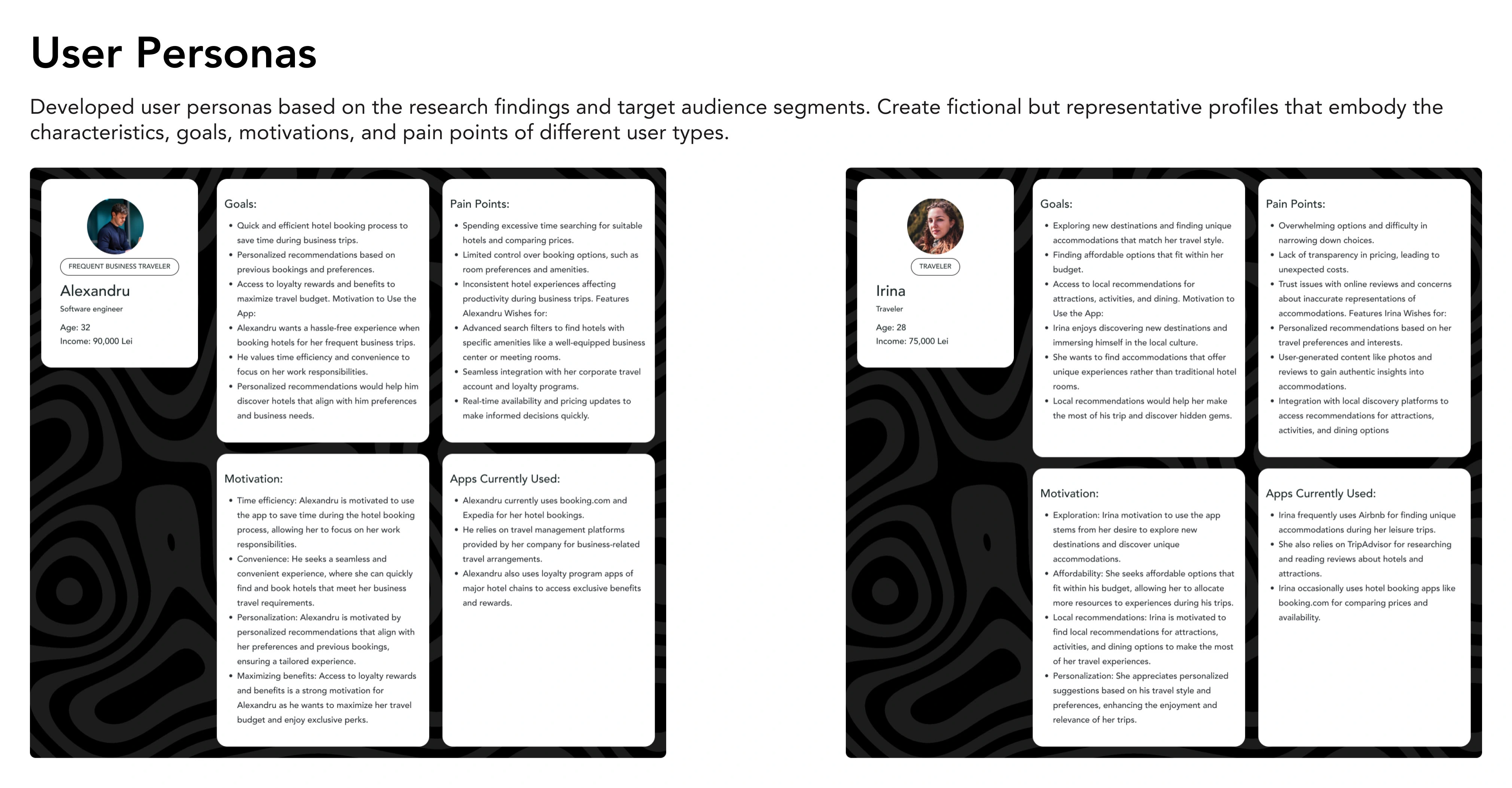
User Personas
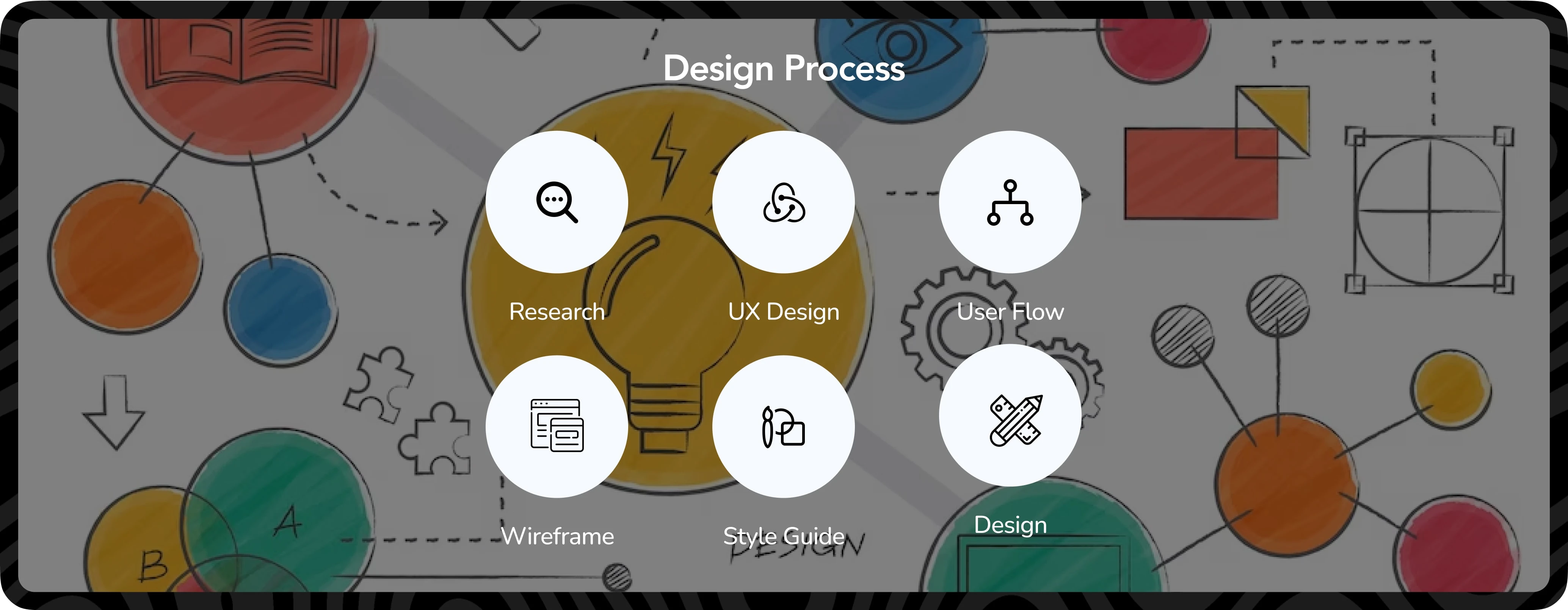
Competitive Analysis
A thorough competitive analysis was conducted to understand the strengths, weaknesses, opportunities, and threats of existing hotel booking apps such as Booking.com and Airbnb. This analysis helped identify areas where the new app could differentiate itself and provide a unique value proposition.
Competitive Analysis (SWOT):
Booking:
Strengths:
Extensive global inventory of hotels.
User-friendly interface for search and booking.
Reliable and trusted reviews from users.
Weaknesses:
Overwhelming search results, making it challenging to find the right hotel.
Limited personalization options.
Limited integration with social platforms.
Opportunities:
Enhance the recommendation system for personalized hotel suggestions.
Implement a more comprehensive loyalty program.
Threats:
Increasing competition from niche platforms targeting specific demographics.
Evolving customer expectations for more customized experiences.
2. Airbnb:
Strengths:
Unique and diverse accommodation options, including homes and experiences.
Encourages localized experiences and interactions with hosts.
Active community engagement and reviews.
Weaknesses:
Inconsistent quality control of listings.
Limited hotel inventory compared to traditional platforms.
Complex booking process, particularly for first-time users.
Opportunities:
Strengthen partnerships with hotels to expand inventory.
Streamline the booking process to improve usability.
Integrate hotel amenities and services.
Threats:
Regulatory challenges in certain markets.
Brainstorming
Integrate user reviews from reputable sources to enhance trust and provide authentic feedback for users to make informed decisions.
Enable users to save favorite hotels or create wishlists for future reference and easy access.
Implement a price tracking feature that alerts users when there are price drops or special offers for their preferred hotels.
Offer multilingual support to cater to a diverse user base and provide a seamless experience for international travelers.
Introduce a loyalty program that rewards users with exclusive discounts, room upgrades, and other perks based on their booking history and frequency.
Enhance the search filters to allow users to refine results based on specific amenities, such as swimming pools, gyms, or pet-friendly accommodations
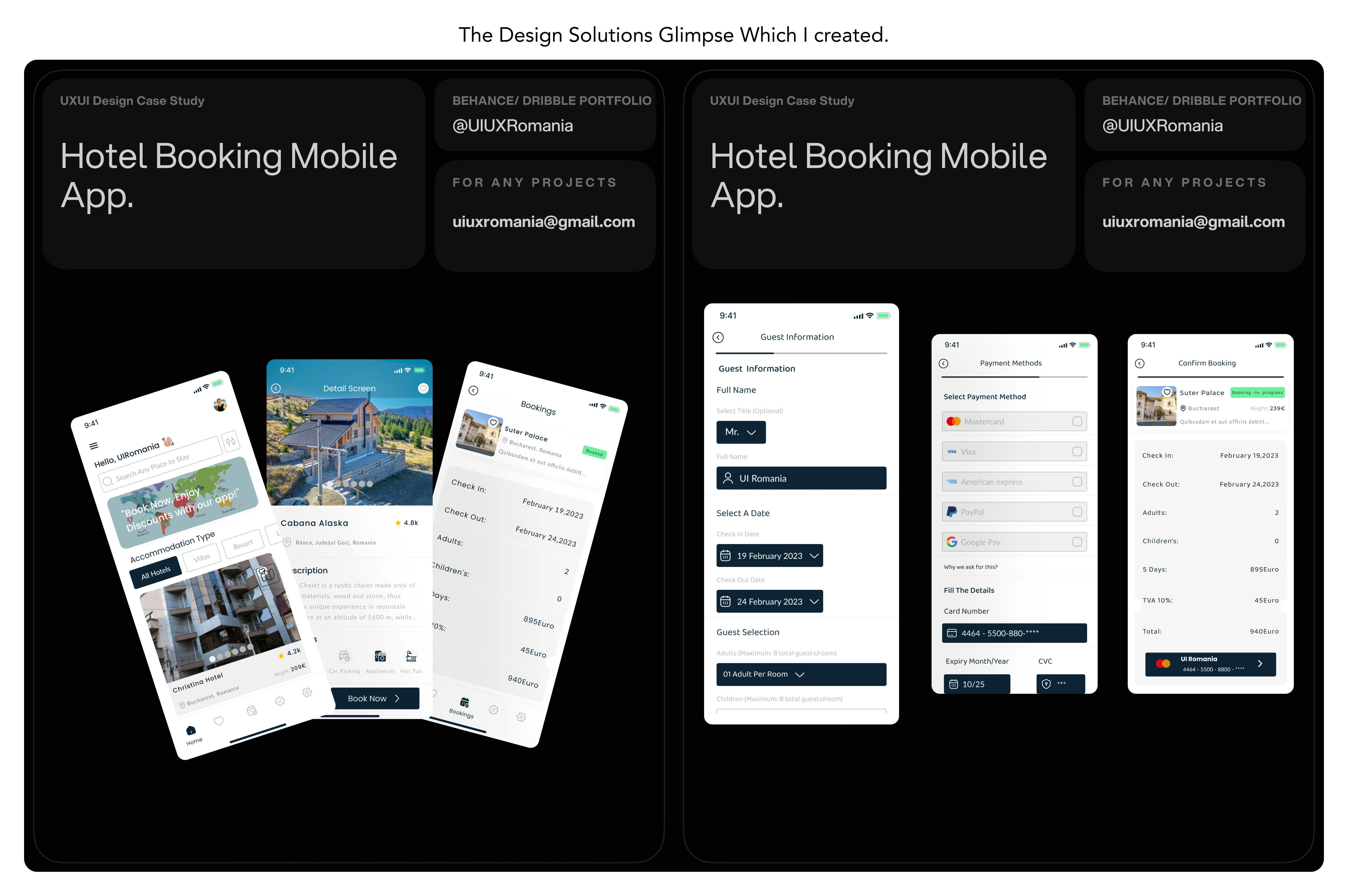
The Design Solutions Glimpse Which I created.
Solution
Based on the user research and competitive analysis, the following solutions were proposed:
Personalized recommendations based on user preferences and travel history.
Advanced search filters to help users find suitable hotels efficiently.
Clear and detailed information on hotel amenities, pricing, and availability.
Streamlined booking process with simplified steps and intuitive user interface.
Integration with social platforms for sharing experiences and recommendations.
Based on these challenges, our goal is to create a hotel booking app that revolutionizes the user experience by addressing these pain points head-on. Our app will focus on providing a highly personalized and intuitive booking process, streamlining search filters to offer relevant and manageable options, ensuring a consistent and seamless user journey, and enhancing transparency with accurate and detailed information.
User Flow
The user flow outlines the sequence of steps a user will take within the app:
User lands on the home screen and enters travel details.
The app displays personalized hotel recommendations based on user preferences.
The user explores the search results and applies filters to refine the options.
Upon selecting a hotel, the user views detailed information, including photos, amenities, and pricing.
The user proceeds to book the selected hotel, enters personal information, and makes the payment.
The app confirms the reservation and provides the user with a booking summary and confirmation details.
Pre-stay, the user can access the trip itinerary, manage bookings, and communicate with hotel staff for special requests.
Post-stay, the user can provide feedback and ratings, access past bookings, and receive personalized recommendations for future trips.
User Journey Mapping
User Journey Mapping: User journey mapping is a visual representation of the user's overall experience and interactions with a product or service across multiple touchpoints and over time. It captures the user's emotions, actions, and motivations at each stage of their journey, from initial awareness to post-interaction reflections. User journey mapping helps identify pain points, opportunities for engagement, and areas where the user experience can be enhanced.
Discovering and Planning:
User is excited about planning a trip and opens the app to search for hotels.
User feels overwhelmed by numerous options but appreciates personalized recommendations.
User explores search results, applies filters, and selects a hotel based on preferences.
Booking Process:
User finds the booking process intuitive and appreciates the clear and detailed information provided.
User enters personal details, selects room preferences, and completes the payment smoothly.
User receives a booking confirmation and feels relieved and satisfied.
Pre-stay Experience:
User accesses the trip itinerary, appreciating having all bookings in one place.
User communicates with hotel staff for special requests and receives prompt and helpful responses.
User feels excited and well-prepared for their upcoming stay.
Information Architecture
Home: Search, filters, and featured hotels.
Hotel Details: Descriptions, photos, reviews, and amenities.
Booking Process: Personal information, payment, and confirmation.
User Profile: Trip history, loyalty program, and settings.
Notifications: Booking updates, promotions, and alerts.
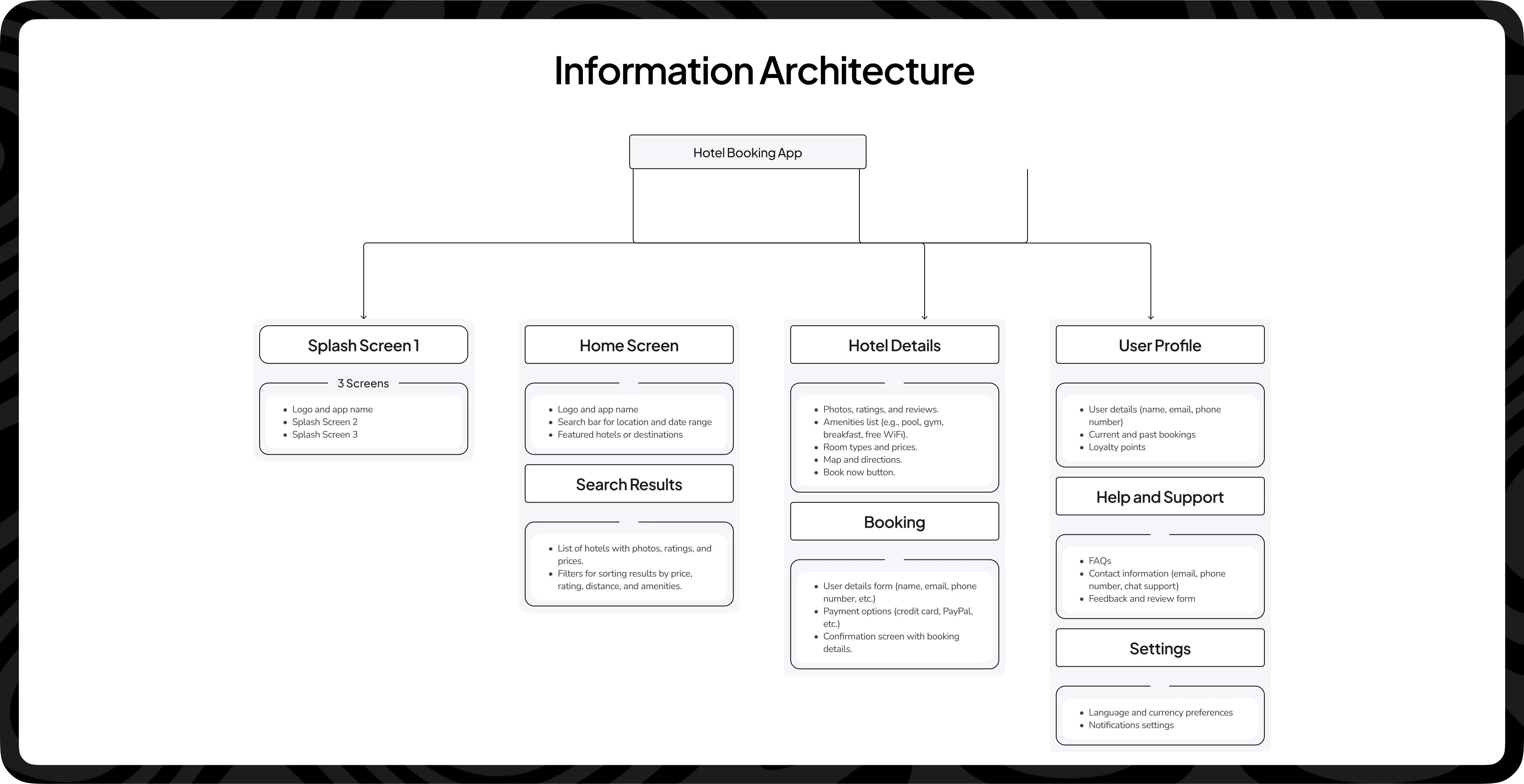
Information Architecture For Hotel Booking Mobile App.
Visual Design
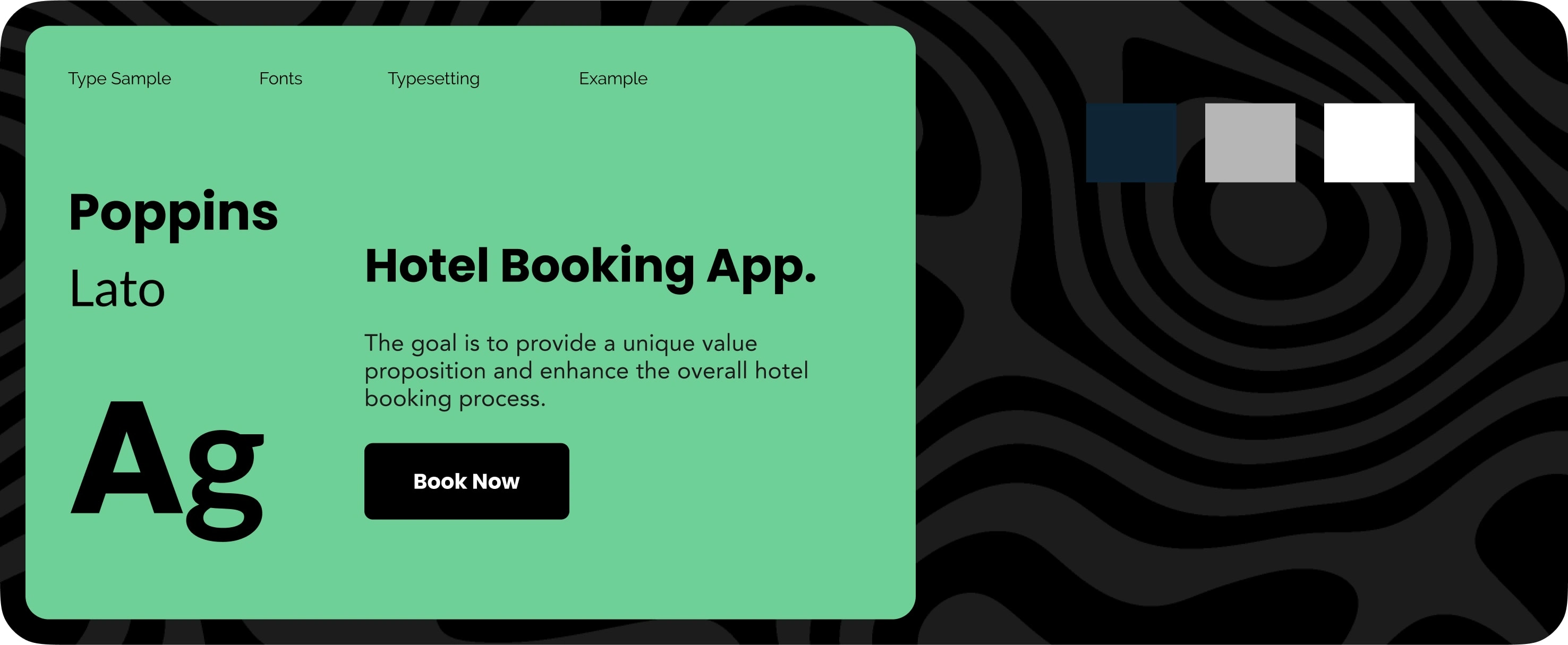
Typography & Color Palette
Wireframe Design
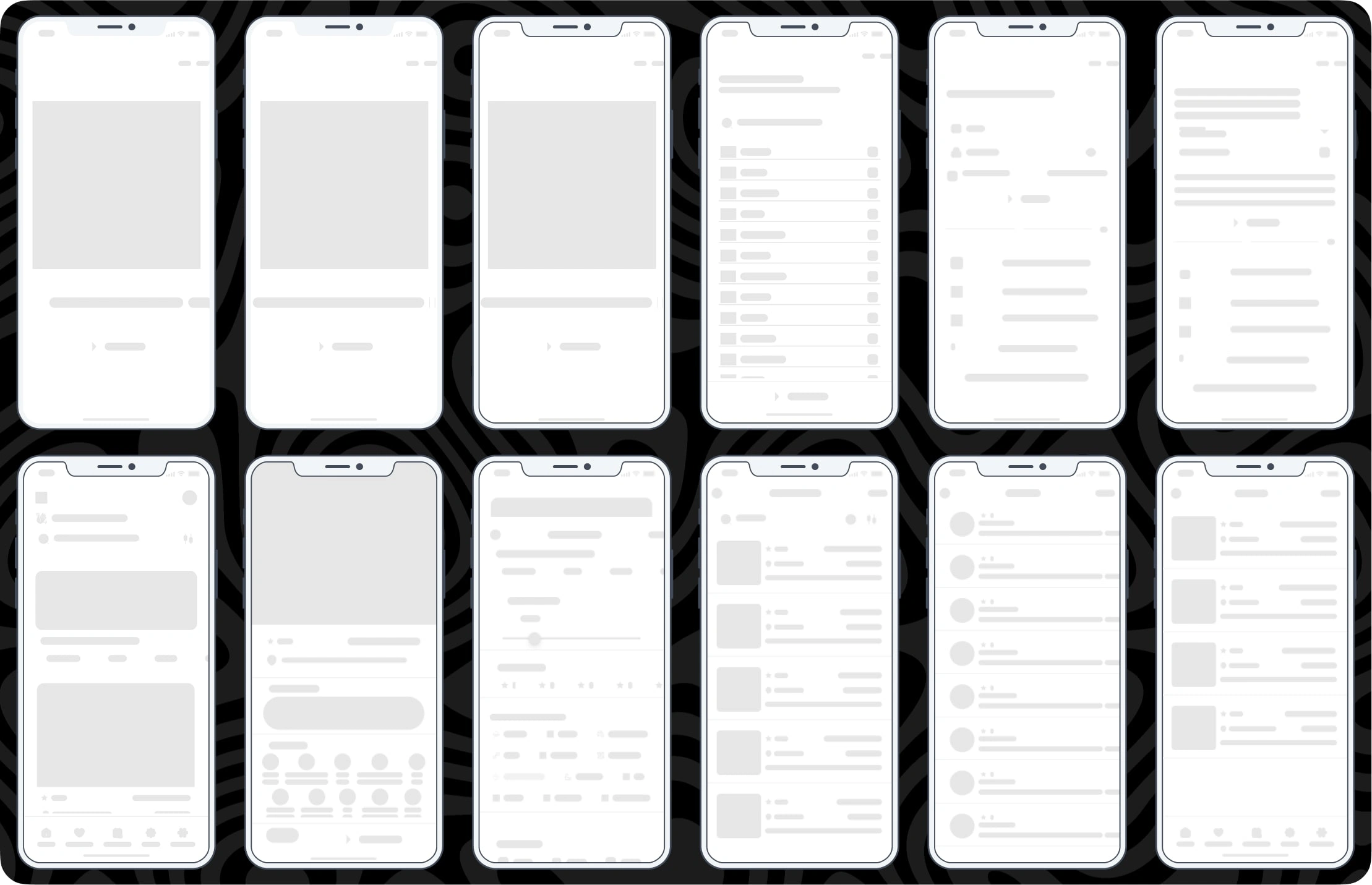
Wireframe
Digital Mockups
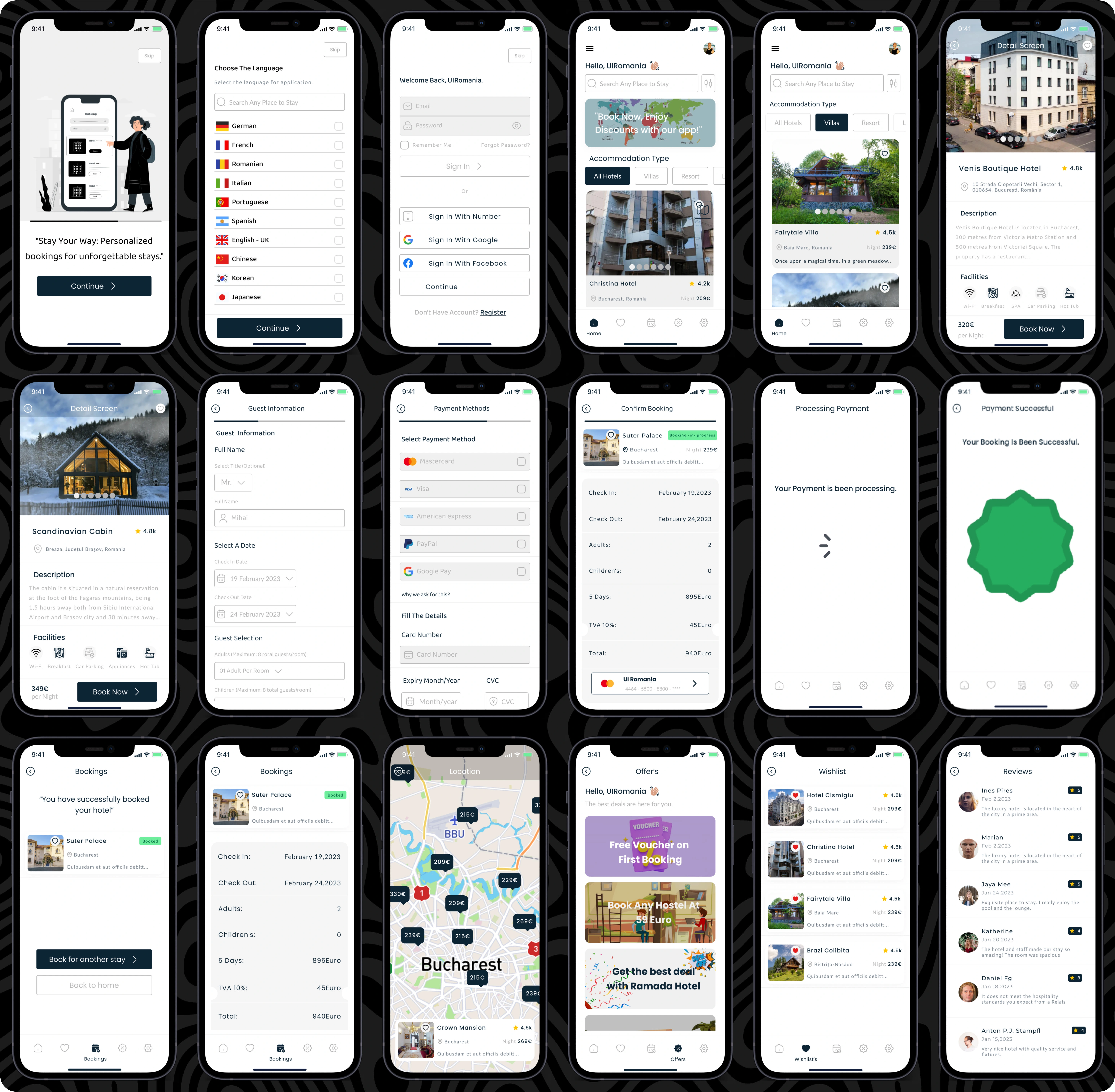
High fidelity design & Digital Mockup.
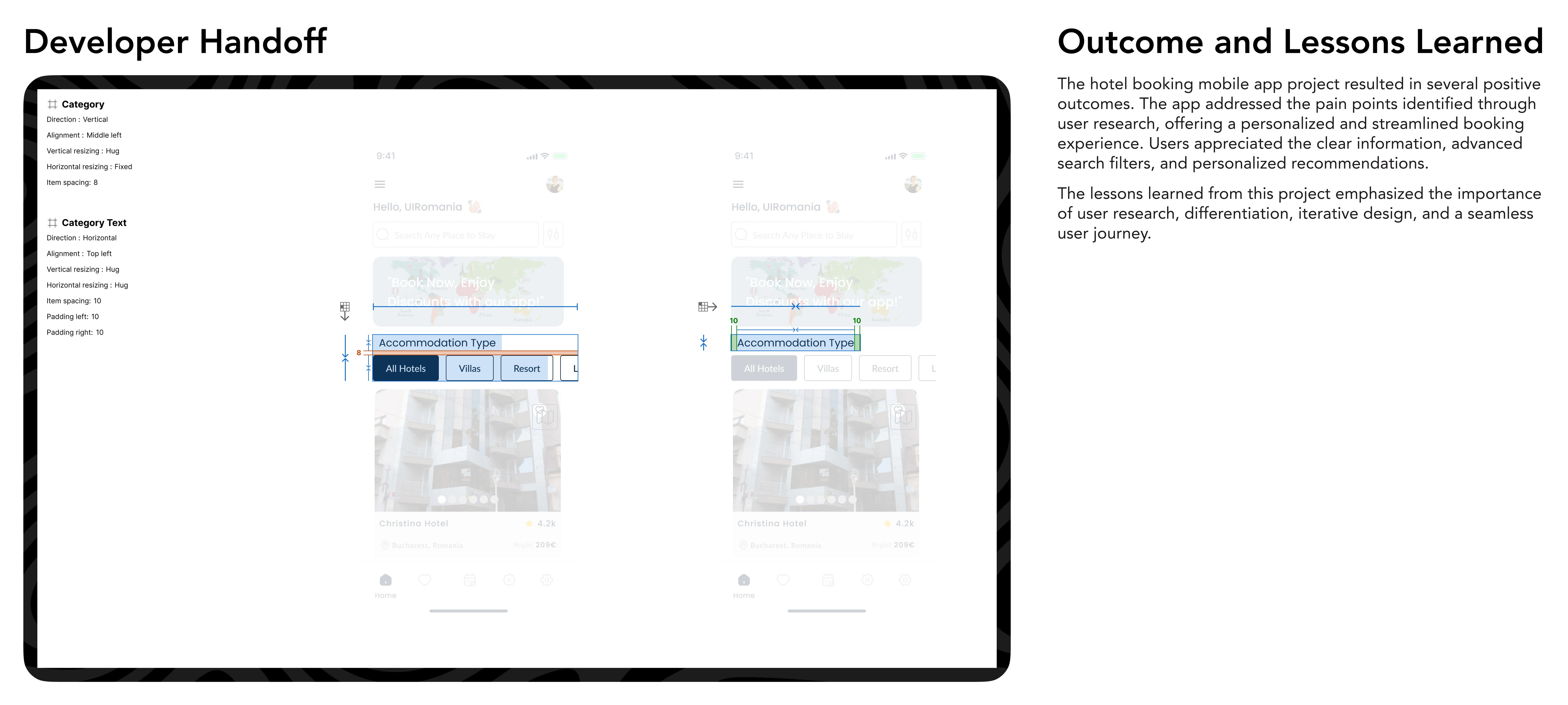
Developer Handoff & Lessons Learned from this Project.
Like this project
Posted May 27, 2023
As an a UXUI Designer, your role is to create a mobile app for hotel booking. The objective is to design a user-friendly and seamless experience for users, addr
Likes
0
Views
116




